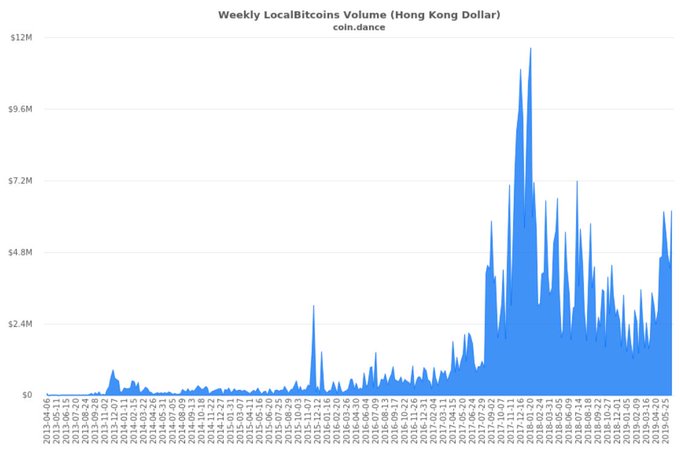Throughout its short history, Bitcoin (BTC) has been seen as anything but centralized, sovereign, and censorable. The crypto asset was created by a pseudonymous individual, is secured by a global group of miners, and is backed by no government, traditional finance system, or common entity.
And as a result, many have looked to Bitcoin and its brethren — other digital assets — as a much-needed escape hatch from fiat and government overreach. Indeed, the cryptocurrency was released in the wake (and seemingly as a result) of the 2008 Great Depression, and many that have since flocked to the cryptocurrency are staunch anti-establishment proponents.
Related Reading: Bitcoin (BTC) Price Defies Gravity: Next Bullish Break Could Hit $10K
Most recently, it seems that those against the recent actions of the Hong Kong government have found value in the cryptocurrency, flocking to it as a means to hedge their bets against financial surveillance and macroeconomic turmoil.
Bitcoin Volumes Spike for Hong Kong
This was purportedly done in response to a criminal case, in which a Taiwanese man murdered his girlfriend, fled to Hong Kong, and was caught by authorities. While this legislature has an innocent premise, as there are so-called “loopholes” in the law, many in Hong Kong aren’t too sure that this amendment to the city’s extradition treaties is what it seems to be.

Those against this bill claim that if the new rule is put in place, Chinese authorities will be able to silence any political dissident, outspoken journalist, or “corrupt” businessman/woman as they please, without any regard for the judicial process or human rights. Also importantly, China would be able to seize the assets of any “criminal” in Hong Kong.
Due to this, the weekly volume on LocalBitcoins, a peer-to-peer Bitcoin trading service, in Hong Kong has spiked — moving from ~HK$3 million to ~HK$6 million (US$380,000 to $US760,000) — within a few weeks’ time.
“It’s started. We’re hearing others are doing it, too, but no-one is going to go on parade that they are leaving… The fear is that the bar is coming right down on Beijing’s ability to get your assets in Hong Kong. Singapore is the favoured destination.”
One man, who remains anonymous for obvious reasons, has started to move more than $100 million via Citibank to Singapore. Others have been making similar moves, finding ways to siphon money out of Hong Kong to other locations deemed prime.
In a similar string of news, some protestors have begun to avoid using fintech solutions, like Hong Kong’s Octopus Card, to ensure that they aren’t leaving any paper trails to their involvement in the demonstrations via centralized ledgers. Bitcoin and other cryptocurrencies are an obvious alternative.
Hong Kong’s intriguing case of increasing LocalBitcoins adoption isn’t the first case of its kind. Per previous reports from NewsBTC, Bitcoin purchasing volume through the popular service have exploded in Chile, Argentina, Venezuela, and other Latin America nations over recent years. This has coincided with bouts of political and economic troubles in those nations.
Finding Use as A Hedge
To back this point, Grayscale looks to three primary facets of Bitcoin’s existence: store of value, spending viability, and growth possibility.
Firstly, as the company has explained, BTC can act (and has acted) better as a store of value than gold. Unlike the metal, the crypto is mathematically scarce, capped at 21 million units; BTC is decentralized and verifiable through the Internet; BTC is portable and divisible through digital technologies, and is unconfiscatable.
Indeed, all these characteristics should give Bitcoin value, even during ruckus on the global stage of politics and finance, hence why many believe that BTC will eventually surmount gold as the go-to store of value.
Featured Image from Shutterstock





0 Comments